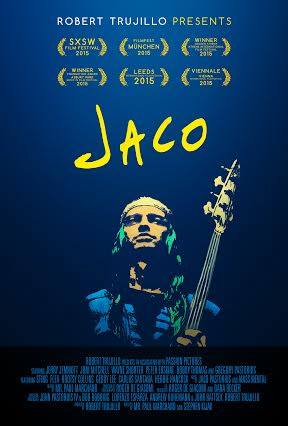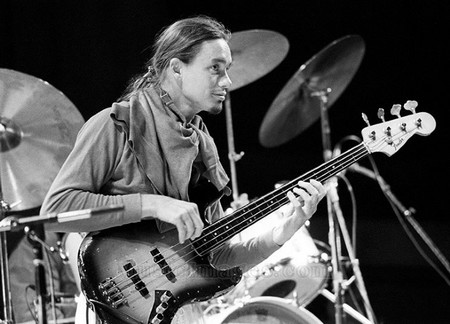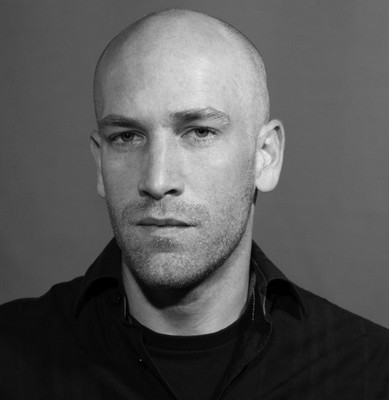The music documentary Jaco started out as a passion project for Metallica bassist Robert Trujillo, who had long wanted to pay cinematic tribute to his four-string hero, Jaco Pastorius. It became one for Paul Marchand, who came on as editor and ended up bringing the film home. A cutter and cameraman who has worked with Martin Scorsese and Chris Rock, Marchand made his feature directorial debut with Jaco, taking the reigns when music doc veteran Stephen Kijak bowed out (both are credited on the finished film).
A jazz fusion master whose records and live performances with Weather Report, Joni Mitchell, and his own bands became legendary, Pastorius revolutionized the bass and its place in contemporary music but struggled with substance abuse and mental illness and died in 1987 at just 35. Earlier this year MusicFilmWeb contributor (and bassist) Steve Karras spoke at length with both Trujillo, the doc’s producer, and Marchand about bringing Jaco’s story to the screen. You can read his Q&A with Trujillo here; in this interview, which has been edited for length and clarity, Marchand talks about becoming a Jacolyte over the course of making the doc, which screens November 11 and 18 at the Leeds International Film Festival (of which MFW is a media partner) then gets a red-carpet theatrical premiere in LA – details below.
Steve Karras: I’m so excited to see this film. I always wanted there to be a Jaco documentary. I read the Bill Milkowski book [Jaco: The Extraordinary and Tragic Life of Jaco Pastorius
Paul Marchand: I’m a filmmaker first. I knew about Jaco beforehand, as a bass player with a really emotive tone, which I love. Over the course of the project I learned about him as a composer and an artist. That was really exciting. We did over 70 interviews. I had over 300 hours of guys telling me about different parts of his life. It was really interesting for me as a filmmaker to learn that much about another artist and all of his motivations, and then try to distill it into a story that was as truthful as possible.
Did you play music?
I played piano for 10 years when I was a kid. I had a really great piano teacher. I just learned to love music from that. I’m a fan of music, I’m a fan of these guys, but I’m by no means a player now.
Where did you grow up?
I grew up in Fort Collins, Colorado, and I moved to Los Angeles for film school. My family, on my mom’s side, is an old working-class American family. My grandfather worked at the Flint, Michigan, automotive plant, and before that they were in the South. The same type of story that Jaco’s family had. They were from Pittsburgh, originally, or from Norristown [Pennsylvania]. I really bonded with his Jaco’s son. We’re the same generation, a lot of the same life experiences.
Does he remember his dad?
Johnny, John Pastorius IV, is the son that had the most participation [in the film], and he was 13 or 14 years old when his dad passed away. He had quite a bit of experience with his dad. The twins [Felix and Julius Pastorius], they’re 32 or 33 now, they didn’t know him that well. Jaco wasn’t in the best shape when they were kids, so they didn’t spend a lot of time with him.
 You’re kind of like the caretaker of the filmic legacy now. Tell me how you got hooked on to this story.
You’re kind of like the caretaker of the filmic legacy now. Tell me how you got hooked on to this story.
I lucked out. And I became passionate about it, which is what kept me in the loop – how much I fell in love with his story, and wanting to tell it right. I’ve always wanted to direct, but I found myself as an editor and cinematographer in other people’s films. I was recommended to Stephen Kijak, who was the first director. I think there were a few directors before him, we just didn’t end up using any of their footage. I was hired as his editor. Stephen went out and shot a lot of the interviews, and I edited while he was out, and then he came back and we had a rough cut that was maybe an hour and a half to two hours long. The family really didn’t like it. Everybody felt like it wasn’t done, and Stephen didn’t want to continue, he wanted to move on to his next thing. So we all got together and tried to re-conceptualize where we want to go. In that time a lot of new things happened. We got access to Joni Mitchell, [respected funk/soul session bassist] Jerry Jemmott, Bill Milkowski – all those interviews, I did after the fact. Went out and shot a lot of verite in New York. I fell in love with the story, and Robert’s passion was really motivating too. He’d go out with [Metallica] and come back, and we’d talk on the phone the whole time. John, Jaco’s son, is very passionate. It became this goal for all of us.
What didn’t they like about the first cut?
At the time they said it was too negative and you didn’t get a sense of Jaco’s personality. He had a very playful and complex personality. The first cut was kind of the standard story of a tragic artist, and there was much more to the story. It took a long time to figure that out. But that was their complaint – it didn’t feel like Jaco. And they were right.
I heard that was their complaint about the Milkowski book, which I really loved. I still got a sense of Jaco and that sent me on my own journey of discovery. You can’t sugarcoat the manic depression which afflicted him.
It’s really tough for a lot of them. He died when they were young. A lot of his friends feel the same way as the family do – there’s this big, open wound that nobody’s really healed from, so it’s really hard from them to hear it. Bill Milkowski loved Jaco. He became a great friend, we spend a lot of time together. I think all of Bill’s opinions about Jaco are completely valid. It’s just that he knew Jaco for a period of his life before the end of his life, and that’s what he wrote about. The kids knew Jaco from before Weather Report, and he was a father who never drank, never did anything. So the guy that Bill explained was a very different man than the guy they knew. The film ultimately is about balance. I think we balanced the end of the story, so we’re not shying away, with his artistic genius, and he’s a family man.
Was Robert Trujillo involved from the very beginning?
Yeah, Robert met Johnny through a bartender 19 years ago. Johnny was in a bar in Florida, and he puts down his card, and the bartender was a friend of Robert’s. He sees “Pastorius” on the credit card and goes, “Hey man, you’re not related to Jaco, are you?” “Yeah, he was my dad.” The guy goes, “My friend has a poster of him in his room, he’d love to meet you.” They met up and they hit it off, and they’ve had this plan to make this doc for 20 years. Robert says that he always wanted to make it, and once he got into Metallica he had the money to do it.
You’re a filmmaker, that’s your medium, and here you’re making a film about art, music specifically. Do you feel like the cinematic language has to complement the music, down to the cutting?
Absolutely. It’s art about an artist – some of the hardest stuff to do. The timing of his music, I really connected with, so all of the editing, I would obsess over it. I had to edit some of his music too, and I put a lot of thought into how to preserve what he wanted in the music while still making it work for the scene that we’re in.
The music has such a very frenetic style. Did he chart all that stuff for the different musicians?
Yeah. There as a guy named Larry Warrilow who helped me a lot, but Larry would say that it was all Jaco. He did do all that. My opinion of what happened, and I got a lot of this from his son too, is that in the beginning the bass gave him his voice. And he was this epic bass player – on his solo album people were like, I can’t believe that’s a bass, look what he’s doing with the instrument. As he developed he would say to people he played with, if they weren’t up to snuff, “Get above the music, rise above the music. You can’t play the music unless you get above it.” I think that’s what he did. He heard these sounds in his head that were much bigger than the bass. When he would meet a new player, he would become enthralled and a fan of what they were doing, and he would start hearing that as a sound that he would build with. He was amazingly charismatic with all these guys, everybody loved him the moment they met him, so he had them in his back pocket – all these musicians that he’s met through the years. He was kind of transcending the bass at that point.
The word icon is so abused, but Jaco really was iconoclastic. There was no one like him.
That’s what I really like about this story. There were a lot of people telling him his whole life, this is what you should do, you should make this kind of music, that’s crazy to do that. And time after time, he went his own way. It didn’t matter if it was going to make money or if it was what other people wanted to hear. It was what was in his head. Anybody with any kind of artistic impulse, that’s what we all need to do more of. That was music that was made by somebody and not for somebody.
Jaco screens November 11 and 18 at the Leeds International Film Festival and opens theatrically in the US on November 22 at the Theatre at the Ace Hotel in Los Angeles. It comes out on DVD






















